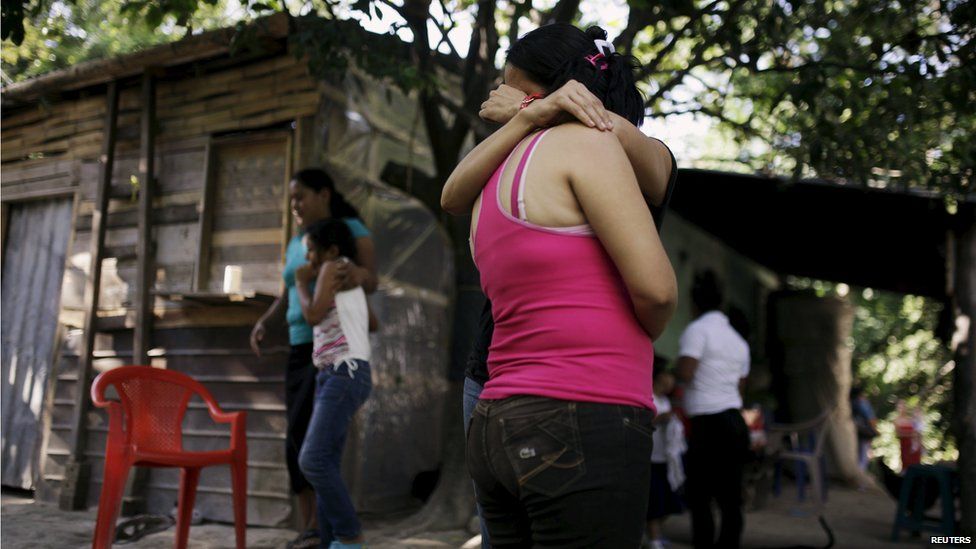Ending the cycle of gang violence in El Salvador
- Published

It is Sunday morning in San Salvador and San Rafael hospital's accident and emergency department is full.
People are lying in the corridors on spare hospital beds waiting their turn.
Those who can sit up are in wheelchairs - not standard hospital issue. These are plastic garden chairs with wheels attached to them.
Public finances are stretched - more than ever, some would say.
June saw 677 murders in El Salvador, more than any other month since the country's civil war ended in 1992.
Juan - not his real name - is lucky not to be another number in those grisly statistics. Thirty-seven years old, he runs a recycling business and a carwash. Four men arrived at his work and opened fire: 40 bullets.
"Thank God just one bullet hit my arm," he tells me from his hospital bed.
Juan says in the 20 years he has had his own business he has never given in to gangs trying to extort money from him. "I'm the sort of person who would prefer to die fighting than be brought to my knees."
The police never came to see him to find out what happened. And did he go to them to report it?
"What's the point? I don't believe in the system," he says. He is now making plans to leave the country with his wife and two children.
Throughout his recovery, he has been seen by nurse Alicia de Polanco. She is a special kind of nurse, not there to mend his shattered arm. There are other people to do that. Instead, she is trying to fix the mental trauma.
'Like flu'
Alicia is part of a project which in English translates as Healing Wounds, supported by a USAid programme. Whether they are gang members or innocent victims, her role is to help to stop the cycle of violence.
"The first few moments are when they are most vulnerable," she says. "So it's very important to get involved."
Violence is just like dengue fever or the flu, according to Alicia.
"If it hits you and you don't realize you're going to have a massive fever, you think you're going to die," she says.
"But if somebody comes along and tells you, look, it will last three days, your whole body will ache but you'll then start to get better, you start reconnecting and picking up the pieces."
Faith
On the outskirts of the capital, San Salvador, is a factory that is trying to pick up the pieces, but in a very different way. It is not long after dawn and all the workers at League Central America are gathered outside. Everyone listens intently to a motivational speech followed by prayers.
Once that is over, work begins. Most of the more than 400 employees are sat behind sewing machines, sewing on labels or cutting material that is used to make sweatshirts and shorts.
All the clothes here are branded with American university logos such as Harvard and Brown and sent to the US.
Just over one in 10 are former gang members, from both the rival gangs - the Mara Salvatrucha and the 18th Street gang. You can tell their affiliation by the tattoos that some of them still have. Up until a few years ago, it used to be standard if you were a gang member.
But tattoos apart, they have started new lives here. One of them - I'll call him Jorge to protect his identity - came to work here through a church group. That is a prerequisite to work here.
After years of robbing, extorting, attacking and even killing several people, he decided to give it all up.
"It didn't make any sense, I was bored of it," he tells me. "I was fed up with suffering. I was in the street all the time.
"My daughter was born and I didn't want her to go through the same thing I had gone through."
The only thing left of his gang days is the tattoo. He pulls down his lower lip to show it to me - carved out with a knife, it is inked with the words MS - to mark him out as a Mara. He says though that gang violence is getting worse.
"They go around killing police, soldiers," he says. "It's partly because of the lack of work, the poverty.
"There are lots of former gang members who want to change their lives but they don't have a way out, nobody gives them an opportunity. So they go back to what they used to do."
Jorge was lucky. He is now one of the chief pattern cutters at League Central America and is thankful for another chance at life.
'No choice'
"People join gangs because they have to. They join because they have no other choice," says Carly Gerstman, the development manager at League Central America.
"We've found that they have the motivation and they have the drive and they have the appreciation that, you know, we are bringing them back in and we are giving them this opportunity, and they take it and they run with it."
Company boss Rodrigo Bolanos says businesses need to play a part in solving the cycle of violence.
"The war between the government and gang members is already here, it's already started," he says.
"In the process of suffocating the economy and the country the private companies need to take a position to look for a dignified way out."
- Published13 February
- Published29 May 2015
- Published30 August 2014